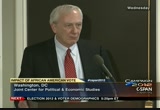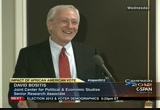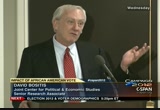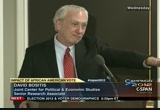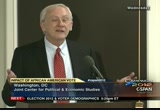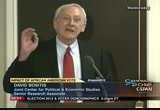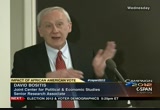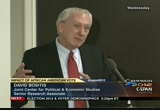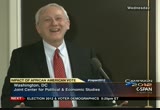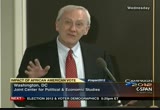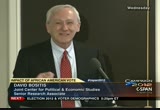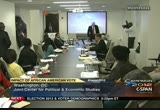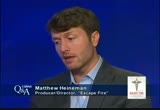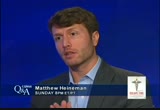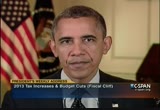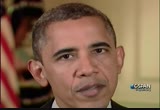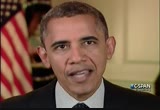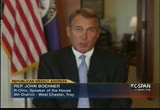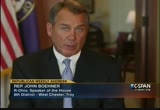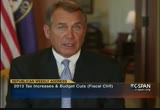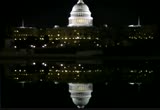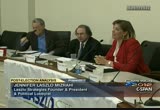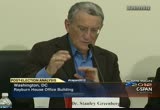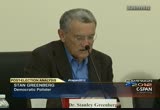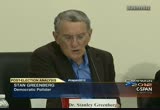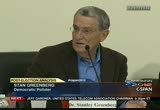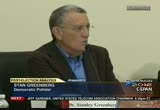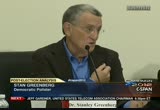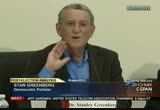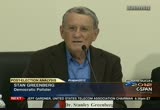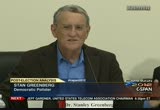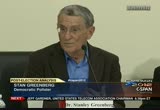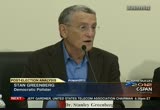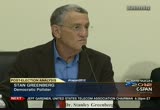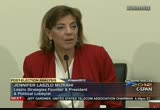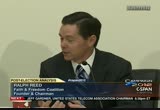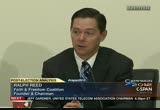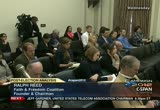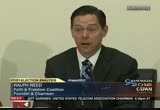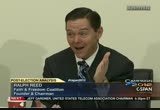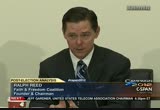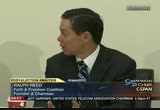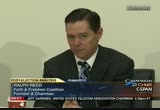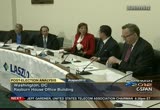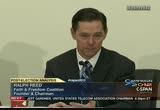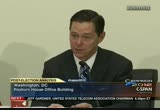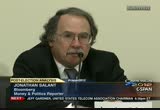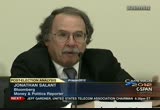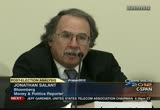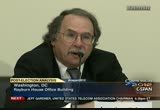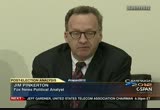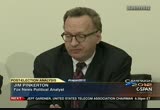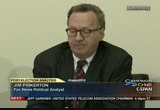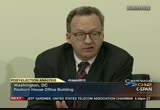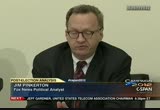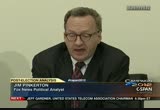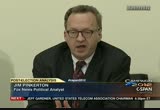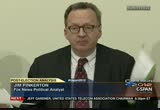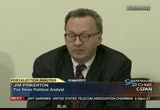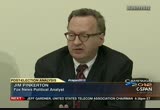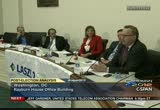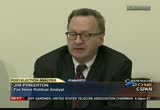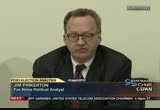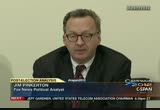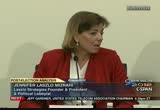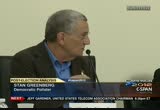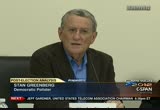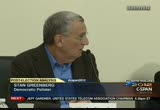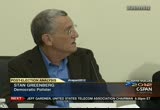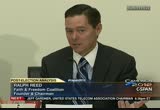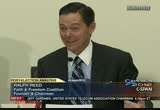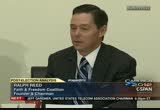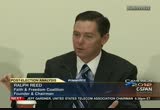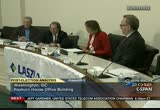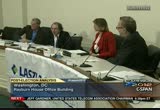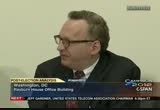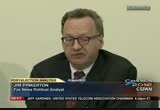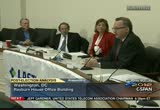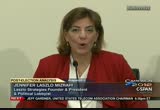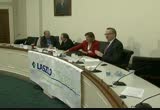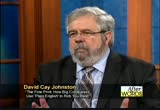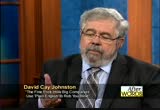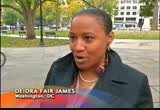tv Public Affairs CSPAN November 10, 2012 5:05pm-6:30pm EST
5:05 pm
who may be the person going forward that will allow them to maintain what they have and also gain what they really prize, which is the presidency? >> i would disagree with you that there was any action involved. the attitude involved -- they held and the views they express were the views they have long held and expressed. 2010 was simply an opportunity that presented itself because the country was in a very bad economic situation. when the country is in that very bad economic situation, especially in the second year of a president's term, they often -- the public, voters, and remember, it is a reduced electorate. the electorate in 2010 was a white electorate, not a 72% white electorate, and 80% white electorate. there were 28 million obama of voters from 2008 who did not vote in 2010.
5:06 pm
so you have a totally different group of people who are participating in the process. i mean, i sometimes lay awake at night thinking, how can you get young black people interested in state representatives? that they would turn out in droves to effect the outcome of the state legislative race? i have to confess, i have not come up with an idea yet. on the other hand, presidential races are different. i would say -- as a matter of fact, one of the big tea party leaders is dick army, the one who called barney frank barney fag.
5:07 pm
and the one who said when bill clinton pass his tax increase in 1993 that that tax increase would destroy the country and destroy the economy. some of you may remember that bill clinton years on the economy were the best they had ever been in american history. it was the same old people that were taking advantage of circumstances that presented itself. that basically -- with a reduced electorate. no, i do not think they have a future. there is a congressman from georgia named paul brown who happens to be a doctor. he thinks that the big bang theory and evolution are works of the devil. you know, that is not the future.
5:08 pm
go to maryland, go to the maryland suburbs and look at the companies that are making billions of dollars doing genetic research. genetic research is all about evolution. >> are there additional questions? >> i just wanted to ask about when you saw effective black and latino alliances during the 2012 election?
5:09 pm
>> and the places where there were blacks and latinos living in proximity, all the states where there are both black and latino populations, in florida, virginia, less so in colorado. the black population is fairly small. nevada, definitely. the right in the country and especially the ultraconservatives in the republican party had pushed african-americans and hispanics together. they have a politics where sort of a nasty braggadocio, if you watch the primaries, where you have to be slashed and burn in how you attack your enemies, that very much does not go over with hispanics.
5:10 pm
some of the things that were said -- i have spoken to a well known latino pollster about this. he said a white person has friends and extended family -- that number is 8. a hispanic person has that number at about 50. if you are a slash and burn person, that is your style, you are not going to go over well with latinos. african americans and latinos have been pushed together. if you look at it in class terms, african-americans, the largest proportion of african americans and latinos are working class and have similar interests in terms of government.
5:11 pm
>> any additional questions? >> you were talking about the turnout during the midterms. you did not note how we could get more young minorities out to vote -- how does that change politics if they come out to vote at a state level and the national level? >> it would totally and completely -- you see, when i look forward, i am getting old now so i do not see myself there, but when i look forward 10 to 15 years. especially if the republican party does not adapt, what will happen is over the course of the next 10 to 12 years, the
5:12 pm
presidency and for that matter a lot of senate seats will be out of reach for the republicans. if they will just appeal to white voters than -- remember, there will always be some white voters who will support the same positions as african-americans and hispanics. there will come a time when if the republicans do not change they will be factored out of national politics. on the other hand, a lot of what takes place in politics, especially day-to-day lives, is determined by state and local government. in terms of the south, local government has very little influence -- it essentially has to get permission from the state legislature to do anything. fairfax county, where i live, they want to raise taxes on gasoline to pay for roads. that is not your call. that is our call.
5:13 pm
that is true in all of the southern states. in terms of influence in policy at that level the only way is by capturing those bodies. the hispanic population, the median age is 25. they will start to age and start to have more involvement. people usually become more involved in politics as they get older. they will have more involvement, but if they do not participate in the off-year elections the impact of that demographic change will be pushed down the road more than it would need to be. it could be right now, or it could be two years from now, or bang years from now, but it is always been pushed further -- two years from now, but is always been pushed further because of the lack of presentation in off-year elections.
5:14 pm
>> i wonder if you of any thoughts about the flood of money into the campaigns this year, and where will the billionaires' take their dollars because the super pac's impact has not been quite what they expected? >> i saw somebody making a snide remark on a website a few days ago about -- i would be interested in what karl rove tells his donors. after the election is over. what is it we have gotten? there are two aspects of that. believe me, when the final numbers are in president obama and his side did not unilaterally decide. this was not a case where billionaires -- they wasted a lot of money, did a lot of stupid things. obama and his people were very
5:15 pm
strategic in their use of their resources. and they had a lot -- he raised about a billion dollars. they were very strategic. obama's campaign can buy a television advertisement at the lowest rates possible. television stations, local television stations selling the ads want to make as much money as possible. they do not have to offer low rates to the super pac's. they can charge the super pac's as much as the market will bear. because of the saturation, they in fact did.
5:16 pm
many of the super pac's were paying 10 or 15 times more for 30 seconds and the obama campaign was. so i do not want to say that -- it would be satisfying to say money did not have any eject, so despite the billions that were poured in and people trying to manipulate elections -- the citizens united campaign, there was an employer who stapled a sample ballot to workers' paychecks. to get an idea of how he wanted them to vote. there were a lot of employers who did that. mitt romney encouraged employers to do that. in terms of citizens united, first of all going back to the earlier case, i will never agree with the proposition that money is speech. speech is speech. like what mitt romney said -- corporations are people.
5:17 pm
no, corporations are corporations and speech is speech. money is intended as a correction of the political process. >> let's give a hand to david. [applause] we thank you again for coming out to this presentation. we will continue to analyze the election and we encourage you to go to our website and look at our website on this topic and other topics that the joint center addresses. we thank you for being here today and invite you back to our next event. thank you very much. [captioning performed by national captioning institute] [captions copyright national cable satellite corp. 2012] >> tomorrow, we look at president obama's second
5:18 pm
term. then we talk to michael steele. later, an update on afghanistan's and reaction to president obama's re-election with in the country. daniel markey is our guest. "washington journal" is less of a cloud a.m. eastern on c-span. president obama will participate in the presidential ceremony followed by a remembrance ceremony. our live coverage begins at 11:00 a.m. eastern on c-span. >> i need some help over here. >> did he try to get up? >> no, he just rolled himself
5:19 pm
out. >> where is sergeant robert yates today? we followed him after this plane ride for many months. he ended up entering himself that a program at walter reed where they used acupuncture and meditation and other techniques to wean him off of the drugs he was on and through this program he was able to walk out the walter reed on his own two feet. i commend the military for choosing -- allowing us to tell a story both the good in the
5:20 pm
back and for recognizing this problem by recognizing there is a problem of over medicating and they are looking for ideas to fix it. that is the pieces of the film -- the metaphor is that the status quo is not working. we need to look outside the box for ideas. >> war with matthew heineman and a night at 8:00 on c-span 2 1/q &a. >> president obama urges members of congress to create more jobs and extend middle-class tax cut. the republican response was delivered by john boehner. he disagrees with raising taxes. >> hi, everybody. on tuesday, america went to the
5:21 pm
polls. you voted for action. not politics as usual. you elected us to focus on your jobs, not ours. that is why i have invited leaders of both parties to the white house next week so we can build consensus around challenges which can only solve together. i intend to bring in business, labor, and civic leaders from around the country to get their ideas and input. one of economy is still recovering from the great recession, our republic -- our priority has to be jobs and growth. it is a plan to reward businesses who create jobs in america and give people access to education and training those businesses are looking for. it is a plan to keep us on the cutting edge of innovation and clean energy and to reduce our deficits and balance it in a responsible way. this is important because at the end of this year we face a
5:22 pm
deadline that requires us to make decisions about how to pay down our deficit, decisions that will impact the economy and the middle-class now and in the future. last year, i work with democrats and republicans to cut a trillion dollars worth of spending. i will work with both to do more. we cannot just cut our way to prosperity. if we are serious about reducing the deficit, we have to combine spending cuts with revenues. that means asking the wealthiest americans to pay more in taxes. that is the only way we can afford to invest in education and job training and manufacturing, the ingredients of a strong upper class and economy. i have put a plan to allow us to make these investments and reduce our deficit by $4 trillion of the next decade. i hope to compromise for new ideas but i refuse to accept any approach that is not balanced.
5:23 pm
i will not ask students, seniors, more middle-class families to pay down the deficit while people making over $250,000 are not asked to pay more in taxes. this was a question in the election. the majority of americans agree with my approach. we need a majority in congress. they should start by making sure taxes do not go up on the 98% of americans making under $250,000 per year starting january 1. this is something we agree on. the taxes on middle-class families should not increase. congress should permanently extend the middle-class tax cuts as we negotiate a deficit reduction package. it would give families and small businesses the peace of mind that will lead to new jobs and faster growth. there is no reason to wait. there will be differences in
5:24 pm
disagreements in the months to come. that is what makes our political system work. you will not tolerate dysfunction. not when you're families are struggling. you want cooperation. you want action. that is what i plan to deliver and my second term. i expect to find leaders from both problems -- parties willing to try me. thanks. have a great weekend. >> i called for action from both parties on a plan to help our economy grow. it is critical to averting the so-called fiscal cliff -- automatic spending cuts and tax rate increases. despite the risks we should let our nation's economy go off part of the fiscal cliff by allowing the top two rates to rise. they believe that doing that would generate more revenue for the federal government.
5:25 pm
raising those rates on january 1 would destroy 700,000 american jobs. many of those hit by those tax increases are small business owners, the people who are the key to job creation. i used to be one. i offer congratulations to president obama. i offered in a tentative to sending our economy over the fiscal cliff. instead of raising taxes, let us actually solve the problem. let us focus on tax reform that close a special interest loopholes and lower tax rates instead of accepting our but if -- arbitratry tax rate. s. 2013 should be the year to begin to solve our debt through tax reform and entitlement reforms. together we should avert the
5:26 pm
fiscal cliff in a way that ensures 2013 is that year. close and special interest loopholes to end deductions and moving to a bare, cleaner and simpler system will bring jobs home and result in a stronger, healthier economy. that means more revenue, which is what the president is seeking. without a strong economy will not be able to balance the budget and raise our country's debt. this can lead to common ground. the president and i had a conversation. we can continue those talks and forge an agreement that can pass both chambers of congress. if there was a mandate in this election, it was one to work together to do what is in the best interest of this country. what is best is getting our economy moving again and keeping it moving so we can begin to restore our children's future. it is an honor to serve as
5:27 pm
speaker of the house. i am inspired by the coverage increase of the american people. especially the 22.5 million veterans who we honor this weekend. to them and their families we say thank you. god bless you. god bless this great nation that you serve so vitally. bastille bully -- valuably. >> this is about one hour. >> thank you for country this panel. we are still missing a couple of our speakers who are on their way. i do not think the election was
5:28 pm
so bad that they will not show. they will be here. it is a busy morning in the media world. ralph reed and others have media appearances they were making. they are on their way. i will start this by introducing the speakers one at a time. i have the same question i will ask each of them. what happened in the election. what does it mean for a america? i will start with dr. stanley greenberg. he worked on the campaigns of bill clinton and tony blair, a who barack, nelson mandela. he is known as the leading pollster in the world in terms of international campaigns. he started to send these e-mails days ago where he was predicting how sure he was of a great big obama a victory and
5:29 pm
how early the election was one to be called. congratulations for your accuracy. i watched the video is that you and james were sending out to everyone who was willing to listen to you about how sure you were that obama would have a big night. let us start with you, stan. in terms of why it happened and what it means for america. >> thank you, jennifer. ralph reed is coming in. delighted to be on the panel with him and to share our mood and observations this morning. a moment of silence. [laughter] no. i will proceed. [no audio
5:30 pm
[inaudible] i am impressed. the scorecard is done. jennifer cost may dr. greenberg. when i first became a poster, i was advised by my first client that i won with to get rid of the doctor because no one thinks a doctor knows anything practical about the world. the world, but senator -- jennifer always reminds me of that. i am going to summarize fairly quickly some of the things i saw in the demographics of this and the attitudes and the politics. i am doing this based on the
5:31 pm
same kind of observation you did. i was doing bbc throughout the night. i was processing in real time. i also have four surveys in the field and i have impartial data from those surveys in terms of what people were thinking and why they voted the way they did. i am happy to get some of that on the table. let me start with the obvious and then go to the less obvious. the starting point, i think, is the demographic and culture of the country. this simple way to look at them is they just got the demographics wrong. there are key groups. they are growing.
5:32 pm
if you look as the electorate is that voted in 2008, it is hard not to stop and say that this is about a new america, an emerging america, an america that has been emerging for some time. it first made itself known in 2006, which was not the barack obama election. i think the was the first mistake was republicans assuming that the obama campaign could not recreate the electorate that elected him in 2008. there is no real difference in the composition of the electorate the elected hampered. in 2008, there was somewhat higher turnout. -- difference in the composition
5:33 pm
electedlectorate keepthat him. in 2008, there was somewhat higher turnout. we have to recognize those changes. there is a minority population that had an impact. together, there were 28% of the electorate. i looked at the nevada population numbers. did you know putt the hispanic population in nevada is growing 2% every year? between this election and the last election, it was an eight. growth. and if you look at the results in nevada, it was an eight.
5:34 pm
race. nevada was not a battle ground states. there is growing diversity in this country. the diversity is much younger. it defines the culture and the attitudes of the country. the second peace unless is unmarried women -- second piece of this is unmarried women. vote fore the women's obama is the same as it was in 2008, which is a big accomplishment. but the real support, a 60%-7%, was unmarried women. there were 23% of the electorate. you then have 23% of the
5:35 pm
electorate who are unmarried women, voting 7% 4 obama. -- 70% 4 obama. they were as important to what happened as the minority piece of this. understand that the mind -- the majority of households are unmarried. young people were 19% of the electorate. in my models, i dropped it to 15%. i thought they were never coming in with the kind of hope they had in 2008. i was wrong on that. there were 19%. it went up from last time, in a tough economy. young people very much culturally drive what kind of country we are and what we respond to. young people. then you have those credits.
5:36 pm
-- poste graduates -- a postgraduate, particularly women. that portion of the electorate has grown and goes heavily for obama. these trends represent a cultural shift and world view. it passed to do with the diversity of the -- it has to do with the diversity of the country, with secularism and faith, with the role of women in the family. there is a whole range of attitudes correlated with this. republicans tried as hard as possible not to have it come into play, but it is the
5:37 pm
cultural attitudes that have more intensity, as we have seen on both sides. i think we have reached a point on this that republicans cannot treat this like global warming. we cannot have the entire science community say that global warming is happening in caused by human beings and say well, we have a different view. we sought in the polling. we had a poll that had the obama lead at 3.8. other major leading polls had the lead at 3. i think we will see today that
5:38 pm
it will probably be in the three-point range. and remember, that number grew steadily well after the election. there are all kinds of contested ballots yet to be counted. there is a massive number of provisional ballots that are not counted yet. those numbers are going to go up. he is going to have a big, i think, national lead, an amazing victory, given the economic climate. and the question is, do the republicans come to terms with those patterns and do they deal with things like immigration, welfare reform.
5:39 pm
welfare reform was the most important thing bill clinton did. i think republicans would be wise to deal with that. you cannot say all right, we accept you even though we spent the last election trying to deny you the right to vote. it is a generational impact. that is a fundamental impact. it takes a long time to change. unless they addresses, they're going to have -- i'm going to introduce two other people -- two other pieces. the second thing is the republican brand and the tea party. it hangs over them.
5:40 pm
if you look at all of the bullish trend memos written before the election, they were saying there is no way you are going to have a six. election. you also had, if you look a favorability is, the tea party is the most unpopular organization out there in terms of defining the party. at the heart of this election is the economy. do we have middle-class jobs? do we have rising incomes? on that question, obama led by 12 points as to whether or not he was on your side.
5:41 pm
mitt romney did fairly well in people believing he would address the issue. but they thought obama's goals were right and who he was going to battle for was right. >> i'm going to turn now to ralph reed, who actually is going to have to leave a little bit early so i want to apologize for that. ofre trying to get a lot events put together the day before the election. ralph reed is a republican strategist. he comes from the faith community. he is the founder and chairman of the faith and freedom coalition. he was a senior pfizer to the bush-cheney campaign in 2000 and 2004 -- senior adviser to the bush-cheney campaign in 2000- 2004. you hosted events and every
5:42 pm
single candidate met with you and spend time with you. this has been a big election for the faith community. what did you see and what does that mean to the future of america? >> i will try to be brief if i can. i want to address two things. the first is more narrowly. i want to talk about some of the things stand touched on, which is the republican brand and some of these demographic changes that have been going on for a long time. i will start with the faith community. i have 17.1 million evangelicals and 17.3 million faithful catholics in top battleground states, of which
5:43 pm
there were 16 in the cycle, which obviously narrowed at the end. give or take 23.5 million voters, we contacted every one of those voters 7-12 times. we are not literally contacting everyone of them separately because a lot of them are married, but we mailed everyone three times, 13 times, had 13.2 million cell phone numbers of evangelical voters. anywhere were early voting began, we tested them. if there early voting began that day, we tested them a 7:00 a.m. it included a link to their early voting location. our analysis, which will be available on our website today, shows that this constituency
5:44 pm
turned out in the largest numbers ever in a presidential election, at least since we have been pulling them, which goes back to the mid-1970's, and that they voted for marchant -- for mitt romney by a margin comparable to what they voted for bush. the faithful catholics, those are catholics to attend mass at least once a week or more often were 10% of the electorate. the evangelicals, according to our polls, voted 77% for romney. that is the same share of the vote that bush got in 2004. the faithful catholics voted 67- 32%. that is a swing of 35 points in
5:45 pm
how they voted compared to four years ago. four years ago, obama won the catholic vote by 14 points. he split the faithful catholic vote. this time, he won the catholic vote by two points. he lost the white -- wide catholic vote by 10 points. now, he won last night, ok, because this is not enough. evangelicals are a quarter of the votes and soon they will be one-third of the vote. if these kind of voting patterns continue, obama is in for a slaughter in 2014. as we saw in 2010, these people came, they keep coming. but the young voters fell in
5:46 pm
2010. the african-american vote fell. the evidence is that this is a personal victory not a political victory. they voted for obama. they came for obama. and i have to say, i was surprised, because there was not a lot of evidence in the polling -- i did not know the people were adjusting their models, but just about all of the evidence shows that 18-24 year-old voters would be 15% of the electorate. it is higher than it was in 2008. just for the sake of clarification and accuracy, they voted for obama in lower numbers. he got 68% of that both water -- of that vote four years ago. but he only got 60% this time. a very impressive achievement for obama. what i think the republicans
5:47 pm
have to do -- and by the way, he lost independence by six points. that is a 14 point swing from four years ago. there are not a lot of people who would have guessed that you would split the catholic vote, a loose white catholics by 10 and lose independence and still win. but again, because of this coalition that stan was mentioning, he was able to eke out a victory. but this was a victory in a status quo election where the republicans kept the house, democrats kept the senate. republicans maintain their advantages in statehouses and state legislatures, that i do not think translates into a big policy shift. what republicans have to do is figure out how to get their small business, hunter, a sportsman, catholic coalition
5:48 pm
and add to it. the most likely place they can add to it is hispanics. they won a majority of the hispanic vote in the critical state of florida and they got 45% of this hispanic vote in ohio. we know that it can be done. i think we thought that obama failure to fulfill his promise of comprehensive immigration reform would hurt him among hispanics. it was the opposite. i mean, counterintuitive lee, it was brilliant not to do it. he broke a central campaign promise to one of the most important and dynamic constituencies in the electorate, but he got away with it. why? because by keeping it on the table, the republicans got positioned as an anti-latino,
5:49 pm
border security party instead of a party that was welcoming those voters. it very much worked to his a bandage. he got a higher share of the vote than it got four years ago. my message to the republican party is that if you want to be competitive in national elections, you'd better figure out a way to get it least 38% of the hispanic vote. i do not know if i mention this, because i am running on about three hours of sleep, but if you take how ronald reagan did in 1980 when he carried 43 of the 50 states and defeated an incumbent president by a larger margin than fdr beat her hoover -- herbert hoover, if you take how he did among the subgroups and you overlay his performance in 1980 over this electorate, he loses by the same amount the
5:50 pm
romney did. so, this is a clear long-term democratic problem for the republican party. the country is coming more diverse. the country is aging. this is going to present some challenges for the republican party. optimistic that they can find a way to reach those voters, but they need to get about it and get about it now. >> since your leaving early, i want to ask, you did not mention the issue is framed in the christian conservative community. can you talk about foreign policy or gay individuals and how the conservative christian community is looking at those issues? >> we are still looking at a post-election survey that we commissioned, that we got this
5:51 pm
morning about 5:00 a.m., but the preliminary evidence is pretty consistent with what i have seen throughout my career. there is a tendency to caricature and stigmatize voters of devout faith and suggest that they live in trailer parks and are poor and uneducated and easy to command. they cling to their guns and religion and vote on gay marriage and abortion. not true. if you look at the evangelicals who voted yesterday, they voted on the economy and jobs to the exact same percentage the rest of the electorate. to put it in biblical terms, it rains on the just and unjust alike. they are also struggling with their mortgages and figuring out how to put their kids through school. they voted to a large part on the economy and jobs. you look at issues like same-sex marriage and abortion, and it
5:52 pm
was about 10% of what drove. i think what you alluded to some poor and foreign policy has become to them, particularly -- you alluded to his foreign- policy -- i think what you alluded to is how foreign policy has become particularly important to them, particularly support of israel. those issues have real resonance among pro-is really evangelicals. >> -- israeli evangelicals. >> jonathan has been covering the sector for a long time. thank you, ralph, for your comments. he is the money and politics
5:53 pm
reporter for bloomberg and also the president of the national press club. what did you see yesterday? >> in 2010 we saw all of this secret money in races and republicans took control of the senate and house. everyone said it would be a foreshadowing of 2012. it was not. obama was able to raise as much money as mitt romney. romney had help from political action committees and outside groups, but the money was even. obama was not swamped. he was able to match spending dollar for dollar. the difference was obama raise the money himself. ralph, you know how important it is to get people energized. if you give $10 to campaign, you
5:54 pm
will probably give it again in a couple of months. you will probably make a phone call. you'll probably tell your friends. he was able to call on donors again and again and was able to raise more than one-third of his money from small donors. by him raising that money himself, the cheapest ad rates go to the candidate. they do not go to the action committees or the parties. so obama was able to have more air time than the super pacs. the one thing obama could not do is expand the playing field. in 2008, he was able to go into places like indiana and north carolina. this time, he did not do that, so he lost those electoral votes to mitt romney.
5:55 pm
mayor ronnie had to make a last- ditch effort to go to -- mitt romney had to make a last-ditch effort to go to pennsylvania, michigan, minnesota. and the get-ty'ies out-the-vote operation had months of headstart over the mitt romney campaign. the republican national committee had all this money in the bank. obama and the democrats had already sent it to the states to start to get out the vote operation. one of the panelists mentions that karl rove was defeated in
5:56 pm
2012. we have to add another name to that, scott reed. the u.s. chamber of commerce won only one race. even with all that money, it did not affect the races. they were prepared. they had their own super pacs and outside groups. they were able to win those races. >> i am going to turn it over to jim, who served in the reagan ministration and the push to administration. he is also a regular on fox news. what do you think happened last night and what does it mean for america? >> thank you and i apologize for being late. i was late for reasons i will
5:57 pm
get into in a moment. i worked in a political affairs office way back in the stone age so i can never resist crunching the numbers. there are two ways of interpreting, if you will, how mitt romney did versus president obama. on the one hand, it is extremely hard to defeat an elected incumbent president. since 1900, at 10 of 14 elected incumbent presidents were reelected. now it is 11 out of 15. it is a daunting challenge. the white house tends to turn over when there is an open seat, as it were. only once since 1986 has a president and a party lost the white house after only four
5:58 pm
years. that was jimmy carter in 1980. democrats came in in 1976, and they left the white house along with carter of the same time. so only once has somebody succeeded in doing what governor romney tried and failed to do last night. in a sense, it was more likely than not that this president would find himself reelected. on the other hand, the republicans of now lost four of the last six presidential elections. and if you count the popular vote, it is five of the last six. something has gone wrong here. in 1988, they had won 21 of 33.
5:59 pm
now it is for of six. that is something republicans have to do a lot of soul- searching on, starting today. on the other hand, john boehner can say that he won a mandate as well. any member of congress in either party is happy to remind you that the legislative branch's mentioned first in the constitution, the executive branch is second. they are all slightly equal but anybody on capitol hill will tell you we are first. the president proposes and congress disposes. i'm sure the republicans are feeling optimistic about the 14 midterms and so on. second midterm elections tend to
6:00 pm
go well for the party out of power. but i think the real take away is the continuity of the concept of divided government. since world war ii, the one party has controlled both the white house and both houses of congress only 28 out of those 67 years. you have to conclude that some they just voted for it again for another two years. so those are the interpretations. as for implications. i can put them in three categories. one is issues that the two parties i tend to agree on. one notable and icon fess they work for something called the
6:01 pm
rate coalition that works on this issue is the corporate income tax. it was striking during the campaign that both in the debates that both president obama and mitt romney agreed on lowering the corporate rate. it's the highest in the world and to bring that down. they don't agree on every issue on that but they had the general idea in common so i think as we look to fiscal cliffs and grand bargains and so on, there is some considerable ground for on the mism that a corporate tax agreement will be in the package. as for disagreements, the one that will immediately leevets mind is energy. the keystone pipeline. if touchdown sum up the mitt romney energy agenda it begins with the keystone pipeline and we'll just see what hams on
6:02 pm
that one. to use an old analogy. we've got energy consuls in this country and climate warming that got a boost in the wake of hurricane sandy and we'll have to see what happens. >> another category, things that didn't get talked about and i think that's very unfortunate and first on that list i would talk about healthcare defined as medicine, as curing things. we've had since the clinton era we've had abun dant discussions of healthcare finances and who should get insured, who shouldn't get insured. and during that same 20-year period t quantity of medicine emerging from the medical
6:03 pm
scientific pipeline has plum metted t. number of new drugs by the e.p. safment down 63% t. number of new antibiotic social security down 80%. the amount of venture cap list in the field is down three fourths depends on which source you look to. in other words we're in this situation and president obama's reelection will only enunciate this further, we are committed to taking care of everybody in this country on their healthcare. the truth of the matter is we've had crude health insurance since the act in 1986 which says you can go to an emergency room and get treated. that is not a satisfactory way to do healthcare but it is a way and nobody disputes that will stop happening in the future no matter who won the election last night.
6:04 pm
but we now have an enhanced and sort of mandated and sense of election mandated commiment to if you're an american, citizen or not, you're going to get treated and everything so the challenge is how do you make it treated. 6 million americans in this country have alzheimer's and that's a $172 billion hit on the economy. and jennifer who has done great work thon has pieces of paper on your chairs which i would call your attention to on this. it is very hard to see how the obama administration working with or not working with paul ryan will be returning to the congress or the gang of six or simpson bowles, or anybody who is wrestling around with his issues, how you're going to make progress long term on medicare costs with als mimers
6:05 pm
which again now 6 million people, $172 billion. for a cumulative cost between now and 2050 is $20 trillion. that's a lot of money. and all the everythings and better management aren't going to change the fact that if people are in a state of dimension sha for a in a nursing home, that's a very costly process and i think it's very unfortunate that these issues did not get raised during the campaign. my friend in the audience here started up the american for curious that the idea that a cure is cheaper than beating a
6:06 pm
treating a disease. he and i met this morning and the meeting ran long and that's why i'm late and i apologize again for that. i do think that maybe this is just wishful thinking on my part but the urgency of the situation to make budget cuts that don't lead to the political destruction of the people making them, and i speak for both parties now. the one lesson of 2010 is when the republicans came out against the affordable care act, they had the medicare cuts in there t obama administration's cuts and they may hay out of that big time. and in 2012 all the exit polls it certainly seems as if the revival of that statement that the so-called $716 billion cut in medicare that the affordable
6:07 pm
care act put in place did seem to take a lot of the sting out of the democratics attacks on paul ryan. so they played each other to a draw but it's a strange situation now we go into 2014 where we've had lessons in the voters just don't like medicare cuts. now if the medicare cuts and changes and vouchers and premium support are inevitable for fiscal reasons, so be it. but then that puts an enormous incentive to people like dr. collins who can think of ways to help mobile lies the country on behalf of actually solving some of these medical problems. we don't spend money on polio now because we cured it. the institute found an old study that the government had
6:08 pm
done in 1950 which projected that if present trends on polio treatment continue through the year 2,000 the cost would have been $100 billion a year. that wouldn't have been daunting for anybody's budget plan. and instead in 19'5" cured polio the disease went away and we don't spend anything on that disease anymore in this country. that's an interesting 60th anniversary that president obama is going to confront in his term the 60th anniversary of the polio vaccine. there is one other anniversary coming up in november of 1955
6:09 pm
as world war ii was coming to a close president roosevelt wrote a letter to van bush who was the head of the r.n.d. for the pentagon and said we've had this wonderful he roik world saving effort to mobile lies technology and radar and all number of inventions and the atomic boc and we -- bomb and we need to bring that effort to the civilian front including medical care. and that document became sort of the founding agenda document for the whole post war effort, purely bipartisan, to put the
6:10 pm
curve sending from science front and center in the national policy. and i think it's been unfortunate that emphasis has fallen off of the national agenda over the last few years and i think we've all paid a price for it in terms of our own health and in terms of future cost of medical programs. and now i'm optimistic we can find a way to get it back on the agenda in this second term. >> if you look in a document that doesn't get any attention but it published from the executive office of the president there is a call there for medical drugs doubling. i think that's a political appropriate approach to take and i hope that frankly both parties take it up in the next four years.
6:11 pm
>> so jim has just put a serious policy issue on the table. this environment we're in. we're inside the capital here. there's not much that happens in washington today because of the partisan fighting. is there room after this agenda where we just spent $6 tpwhl a campaign beating each other's brains out and coming up with the same congress, president and senate in coming one curing als mimers or any other agenda? we start with something from a partisan perspective. >> let me put this on my wish list.
6:12 pm
>> the now that's a form lose because that's what understand 2010. 2010 set up 2012, that is the extremism of the tea party, the polarization set up the 2012 election so that we have a situation where republicans have won a -- the most votes in only one national election since 1992. they are not a viblee national party. they can't elect presidents of the united states. if their strategy for 2014, which is majority leader, or the republican leader in the senate seemed to say, then we're not going to get there.
6:13 pm
they're going to minimize the interpretation of this election. if youing focus on this election, it is a landslide battleground election with the president with the majority of the vote. we'll see the numbers again will go up. i think his actual overall vote will be seen as substantial. the underlying consequences of the trends are even more serious. and i think it's possible that people -- and i say that indeed there needs to be some period of in the lame duck or even in the next year where republicans learn or seemed to have learned from it. it is a misreading from the senate election to say it's status quo. and it's a misreading to say this is a non-event because incumbents always get re-elected. no leader -- incumbent leaders
6:14 pm
across the globe have gotten slaughtered and it was amazing this president got re-elected. and these forces enabled them to win in that context. >> what does that mean for policy? >> what i'm saying is do they in the days after this say if we're going to be a national party that we have to think about this differently? which i think there are areas in which you could move to reach action. by the way, they didn't run -- if you look at what they did on the ryan budget, they didn't run on the ryan budget. they tried to muddy up the healthcare reform by saying they want to do more cuts than us. they didn't take the reform of entitlements and social insurance to the country. they hid from it it. the tea party house members who got re-elected hid from that record in order to get
6:15 pm
re-elected. the senate in montgomery used the fact as evidence of being bipartisan. so they didn't run as tea party republicans seeking to get re-elected. so maybe when they come back they'll look at what happened in the senate which was a sweep. so there is an opportunity on immigration reform and tax reform and energy. and then i could put a whole series if you made a decision that we will benefit from learning from this election. >> i'd like to respond to that by pointing out a lot of these vick toirs senate candidates ran as far as from barack obama as it was possible to do and still be in the same party.
6:16 pm
today just for depun google or go to youtube and watch the last ten heidi hite camp ads in north dakota for the keystone pipeline, for increasing coal production, for offshore drilling for oil, for fixing obama care. joe donnelly, okay he beat richard mourdock in indiana but the idea that people were voting for keeping obama care as is and his spending agenda, it's not backed up by the data. joe donnelly is as prolife, promarriage as you can be and be a democrat and be in the party. look at tim cain who was chairman of the d.n.c. two years ago. he's basically running ads criticizing barack obama on raising tax on small business
6:17 pm
in virginia. so i don't think it's going to wash to say this is an across the board repudiation on where conservatives have been on policy matters. i think if you look at the exit polling, a pleura alty of the electorate is for repealing all or most of obama care. and i was distributing voter guides in every one of these targeted races. we went to every one of their web sites and reserged every one of their debates. they said i don't like it the way it is. i do think we need to allow children under the age of 25 to stay on their parent's policies which was one of the key elements of obama care and we ought to keep the previous condition provision. but beyond that we got to fix it. i'm against the individual
6:18 pm
mandate, i'm against the $2500 fines on businesses. they were critical of the program. they would say i stand the one area. whether there will be bipartisan progress i can't really say because i can't speak to how the white house will approach. this but i think there is a strong desire to -- i'm not sure i want to throw the red meat in the shark tank of comprehensive reform because that includes so many things. but i think there could be progress on immigration. i think if you look what rubio's proposed with his form of the dream act. with regard to your specific question which is increased funding for research into some of these dreaded diseases, sure i think you could have
6:19 pm
bipartisan consensus on that. i think if you go back to the stem cell debate. we had deep and grave moral concerns about the harvesting only embryos in order to get those cells. i think we may have lost the political battle on that but scientifically speaking t greatest advances on stem cell research have taken place with adult stem cells. if you can find those areas of agreements, i think there will be some curious and scientific breakthroughs that would move us beyond saying we're going to have to cut medicare by $10 trillion over the next 50 years. >> i'm going to let jonathan respond and then one prediction on what they see ahead. >> do people want to work
6:20 pm
together. and if politically if you think you can do better by opposed everything, you'll oppose everything. and if politically you think you can work out deals in the way gingrich worked out deals with clinton, they'll work it out. it's a matter of both sides coming to the table and give and take. >> that was very fast. a journalist version of what's going on. stan, predictions. >> i think the surprise may be what happens with healthcare reform and the implementation of healthcare reform. because we've talked about the polarization as if other people reasoned involved and there are so many people in the process having to make decision about how to implement the healthcare reform law including the insurance companies and governors and exchanges and i
6:21 pm
think the interests who want to proceed, i think there will be tremendous pressure to put your head down and implement change and make it a point of progress. it may be very hard to come back to obama care. it came out of this much more popular even in our polling on obama care in the electorate that voted. and i think it will be an issue of the past as it gets implemented. >> we have a fiscal cliff that has to be addressed or there's $1.5 trillion in cuts that get repealed because the bill was written that way. so the question becomes what they do about it and they have to do something abet or we're going to be in another recession and taxes are going to go up for everybody and nobody wants to see everybody
6:22 pm
pay more in taxes. >> let me tell the audience if you want to send me your prediction go to the website and send me an e-mail, because i'm interested not only what people are saying in washington but what people are saying at home about this election and what it means. >> in terms of what could happen in terms of consensus, i do agree with ralph and stan also that immigration is probably something where there will be some forward progress on. i also agree with stan that the health insurance issue is probably somewhat played out. i was struck when the shootings happened in colorado over the summer, that was exactly the demographic of people who don't have insurance, young working class people and the hospitals said of course we'll cover them. we'll find the money from
6:23 pm
somewhere come what may, we always have. in terms of a prediction, i'm a little bit healthcare on the mind since i just met with dr. collins this morning, there's a congressman rob andrews who is a fairly senior guy in the democratic conference who is -- had an article in the "wall street journal" which he called for an apoll low style on medicine and he said we should be focusing on wounded war yors and not just paying for your wheel chairs and maintenance for the next 60 years of their life but putting them back together and helping them walk and getting their brains fully functional and so on. and that's to me an unbelievable powerful political argument and i think the moral
6:24 pm
conscious of the country would be awakened on that score. so he's talking about a genuinely higher effort perhaps through some innovative financing mechanism that will be unvain lt probably by the end of this year. and yes, we have to deal with the fiscal cliff and enormous circumstances but the reality that we spend $2.6 trillion on healthcare in this country and only 4% on medical h and d we see the results in fall off of new treatments and curious and i think the chance to unite the country around some way to make healthcare cheaper just as we've made electronics cheaper using technology as opposed cutting here and trimming there, the economist has a new
6:25 pm
book about healthcare. if it's labor intensive, if it's expensive. if you want to make it cheap you have to think about automation and i.t. i think it will be quite exciting come 2013. >> i want to thank all the candidates who ran for office whether they were democrats, republicans or some other party for their willingness to serve this country. i want to thank those who engage in voting which is our highest civic duty. for doing that i want to recognize we are at a junk chure in this country where 49 roughly voted for each candidate so we're going to have to come together to heal. so it's great to start than process having democrats and republicans on a panel who are thinking thoughtfully about these crisises.
6:26 pm
i want to thank the first panel and ralph reid who left earlier. thank you for what you did not only on the panel but for your serious thinking you do on these top picks day in and day out. so thanks for coming. [applause] [captioning performed by national captioning institute] >> tomorrow on "washington journal" we'll look at president obama's second term. then we'll talk about the future of the republican party with former republican national committee chairman michael steel. and later an update on afghanistan and reaction to president obama's reelection in the country. washington journal, live at
6:27 pm
7:00 a.m. eastern here on c-span. >> president barak obama will be at a veterans day ceremony at 11:00 a.m. eastern here on c-span. >> america ranks 29th now in the speed of its internet. we pay the highest prices in the world by far, by one measure we may 38 times what the japanese pay. if you have one of the triple pay packages you pay on average $160. in france you pay $38 u.s. and you get worldwide calling to 70 countries not just the u.s. and
6:28 pm
canada. you get worldwide television and your internet is 20 times faster uploading and 10 times faster downloading. all of these other countries understand a fundamental principle. in the 19th century canals and railroads were the key to growth as industrialization came along and touchdown move heavy things as steel. as the 20th century came along it was highways, and airports that were crucial to economic growth. now it's the information super highway and what does the industry say don't call it that anymore. >> the many ways corporations try to rob you blind. tonight at 10:00 eastern. tomorrow at 6:00 eastern watch for tom wolf on his latest back to blood. this weekend on c-span2 book tv.
6:29 pm
>> i have the same favorite program is book tv. i like the coverage of the book fares and on c-span they'll cover leckchures from different his tornadoes, university or book fares and i find it very informative. i like the diversity of the coverage because i learn about to be i can that is i wouldn't encounter so i learn things about the stories of the new south and that's not something that would pop up on some of the searches i normally do but we watched it and learned a lot about the characteristics of the new south versus the old south. i also get introduced to books that maybe my friends and colleagues aren't talking about but somet
141 Views
IN COLLECTIONS
CSPAN Television Archive
Television Archive  Television Archive News Search Service
Television Archive News Search Service 
Uploaded by TV Archive on

 Live Music Archive
Live Music Archive Librivox Free Audio
Librivox Free Audio Metropolitan Museum
Metropolitan Museum Cleveland Museum of Art
Cleveland Museum of Art Internet Arcade
Internet Arcade Console Living Room
Console Living Room Books to Borrow
Books to Borrow Open Library
Open Library TV News
TV News Understanding 9/11
Understanding 9/11